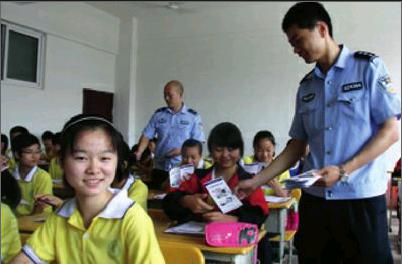GUARDING THE VULNERABLE
2015-02-05ByJiJing
By+Ji+Jing


Child victims of sexual abuse may not be preyed upon by strangers, but rather people known to their family, according to one report published by the Protecting Girls program, a charity project, in May 2014. The report covered sexual abuse cases exposed by the Chinese media from May 23, 2013, to May 22, 2014.
In recent years, there has been increasing media coverage on children becoming victims of sexual abuse. On May 8, 2013, a headmaster and a government employee in south Chinas Hainan Province were reported to have taken six primary school girls to hotels. Within 20 days of the incident going public, eight more cases of children being sexually abused had been reported by the Chinese media. These incidents have caused nationwide concern over the safety of the most vulnerable members of society.
Reports of sexual assaults on minors were disturbingly frequent from 2013 to 2014 in China, with a total of 192 cases having been reported by the media, according to the aforementioned report, averaging out at one reported case every 1.9 days. However, the total is tragically predicted to be far higher, with unreported incidents considered to likely be much more common, as victims are often afraid to tell their parents or teachers.
In some cases, parents who have learned about the cases have chosen to keep quiet out of concerns over their childrens reputation, Wang Zhongwu, a professor of sociology at Shandong University, told Xinhua News Agency in July 2014.
The report also said that most of the 343 victims involved in the reported cases are primary school students, with children between 8 to 14 years old accounting for 85 percent of the total. Over 55 percent of the cases happened in rural areas, where many children have been left behind in the village to live with other relatives while their parents seek a living in the cities. Of the 192 cases, over 80 percent were committed by acquaintances, with 42 cases committed by the victims teachers and 36 by their neighbors.
For example, seven girls from Shangyuan Village Primary School in Ruichang, east Chinas Jiangxi Province, were sexually assaulted by their 62-year-old teacher Tao Biaogong from September 2012 to May 2013, according to Xinhua. Tao called the girls to the classroom or to his dormitory under the premise of correcting their homework or listening to them recite passages from the textbook. Six of the seven girls were found to have contracted sexually transmitted diseases, and all of them were leftbehind children whose parents entrusted them to the care of their grandparents when they were less than 1 year old. In addition to the physical harm caused, the girls have mental scars that could be considered even worse, with some tragically showing suicidal tendencies at their young, fragile age.
“Left-behind children, especially girls, who live with their grandparents or other guardians often lack adequate protection and care, which predators may identify as an opportunity. The psychological wounds inflicted on this group of children are often deep and difficult to heal,” said Sun Yunxiao, Deputy Director of the China Youth and Children Research Center.
It should also be noted that being a victim is not gender specific. Of the 192 cases reported, six cases were assaults on boys. For example, a 7-year-old boy in Shadun Village of Wuxue, central Chinas Hubei Province, was sexually abused by one of his male teachers and contracted a sexually-transmitted disease from the attack, Xinhua reported back in 2013.
The boys parents worked far away from home in south Chinas Guangdong Province. The boy told his parents that the teacher would give him some snacks to eat every time before he abused him. As a result of the abuse, the once active and happy boy has become quiet, according to his mother.
“Today more and more boys are becoming victims of sexual assault. However, as the victims are often ashamed to report the incidents or lack awareness of self-protection, many of these cases have been kept secret,”Gao Yujing, the host of a helpline for children of single parents, told Beijing Evening News in November, 2014.
“Sexual abuse will cause both physical and psychological damage to a child. Some victims will hate school, suffer anxiety or depression, or even develop split personalities. It may also affect a childs attitude toward sex,” Li Chunman, a psychologist told China Youth Daily in July 2014.
Lack of education
The frequent exposure of child sexual abuse cases underscores the lack of sex education in China.
“We seldom tell our children what things nobody can ever ask of them, as a result, many children who have become victims of sexual abuse have no idea that they have been abused. We seldom tell our children that they can say no to teachers if they ask them to do something that makes them uncomfortable,” Li Bin, a professor of sociology with the Central South University in Changsha, central Chinas Hunan Province, told Xinhua in July 2014.
According to a survey of 235 boys and 219 girls conducted by the Protecting Girls program, only 17.58 percent of children know what sex education is, 60.88 percent have no idea of this concept and 21.54 percent know a little about it.
Of the 902 parents surveyed, only 35.92 percent have given their children some form of sex education. However, many parents have never taught their children about how to prevent sexual abuse.
“In China, few parents have recognized the importance of sex education, and often wait until their children are 14 or 15 years old, “Hong Daode, a law professor at China University of Political Science and Law, told China Daily in June 2014.
“Schools only offer physical health classes rather than opening sex education courses, and most victims lacked awareness of how to protect themselves,” he added.
Rise to action
The high incidence of sexual assault cases has caught the attention of the government. On September 24, 2013, four institutions, including the Ministry of Education, the Ministry of Public Security, the Central Committee of the Communist Youth League and the AllChina Womens Federation, issued a notice, demanding local educational departments carry out sexual abuse prevention classes by giving courses and compiling and giving out pamphlets.
Social organizations are also taking actions to combat child sexual abuse. The Protecting Girls program represents one such initiative.
The program was launched by 100 female journalists from across the country in June 2013 following a string of sexual abuse cases which broke out that year. The program is aimed at popularizing knowledge about how to avoid sexual abuse and raising childrens awareness of self-protection against such an offense.
“However, the biggest challenge is to give the lessons in rural areas where there are a large number of left-behind children. However, so far few local governments in such places have contacted us. Another problem is that there are not enough volunteer teachers,” said Sun Xuemei, one of the initiators of the program.
The program has compiled their own teaching materials which have been modified over 40 times by more than 20 experts on child protection. By July 23, 2014, the program had trained nearly 1,000 volunteer teachers and had given lessons to over 100,000 children in more than 20 provinces including Shandong, Zhejiang, and Yunnan. It had also given out over 120,000 pamphlets on preventing sexual abuse.
Many local government departments are also inviting our teachers to their schools. “Some places find it difficult to compile their own textbooks, so they asked us to give classes there,”Sun added.
Shortcomings of the law
In addition to spreading knowledge about how to prevent sexual abuse, Chinas laws are also being improved to impose harsher punishment on offenders.
Participants at the annual sessions of the National Peoples Congress (NPC) and the National Committee of the Chinese Peoples Political Consultative Conference (CPPCC) in March 2014 have proposed to repeal the law that identifies sex with an underage prostitute as a separate crime, claiming that such crimes should be treated in the same way as the rape of a child, and punished accordingly.
Under the current law, people who have sex with prostitutes under 14 years old face a maximum of 15 years in prison, whereas those convicted of raping a child face the death sentence.
Zhu Zhengfu, a member of the National Committee of the CPPCC, criticized criminalization of children under 14 who are pushed into prostitution, saying that the law improperly treats the victims as prostitutes, rather than children who have been raped.
However, the proposal was not accepted as the NPCs Legislative Affairs Committee replied that the law itself is not wrong but it is improperly applied to cases where rape is involved. The application of the law should be more strictly supervised in the future to ensure justice. However, the committee also said it would take into consideration the sug- gestions while revising and improving the Criminal Law.
Role of schools and parents
With legal progress in protecting children from sexual abuse yet to be made, parents and schools should play their part in protecting children from sexual abuse.
“Parents should give children the necessary sex education,” said Sun Yunxiao with the China Youth and Children Research Center.
They should tell children at an early age that others should not touch their bodies, especially the private parts. If children know such a simple thing, they will shout aloud if somebody tries to abuse them and the offenders may stop their act, he added.
For those parents whose children have already suffered abuse, they should call the police. Parents should stay calm and keep evidence such as the pants their children wore when being abused.
Once children have suffered abuse, they should tell those they trust rather than hiding the fact. Some girls who have been sexually abused feel too ashamed to tell their parents. Such attitudes could be changed through sex education.
In addition to giving sex education courses, schools should enhance safety measures.“School management staff should conduct regular patrols of classrooms and equip students dormitories with protective measures because many sexual assaults occur in classrooms and dormitories,” Shi Weizhong, a senior official with Chinas Supreme Peoples Procuratorate, said.
Also, to prevent teachers from committing sexual abuse, higher moral standards should be upheld for teacher recruitment. Once employed, teachers should receive training programs on morality.
“We should trust teachers, but on the other hand, restrictions should be set out on contact between teachers and students. For example, teachers should not offer one-to-one instruction to students in the dormitories but in their office, with the door wide open,” said Sun Yunxiao.
